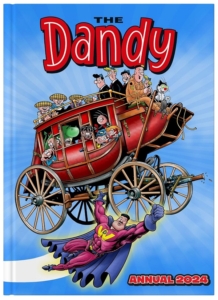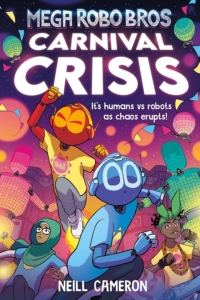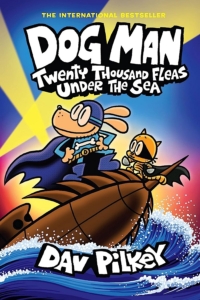
There’s a Serious Side to Comics
Neill Cameron explains.
Comics are very silly, and children shouldn’t read them. That’s not my own opinion, of course. Indeed, full disclosure, I am a professional comics creator and thus have a vested financial interest in the idea that children should read comics, as many of them as possible, and preferably mine. But occasionally tales reach my ears of well-meaning parents or teachers who, seeing how obsessed their children are with comics, react with alarm and try various combinations of bribery, discipline and imposed book-choice restrictions to move them onto reading ‘proper’ books instead.
Honestly, I find this baffling. You see kids being excited about reading, engaged with reading, falling in love with stories and characters and joyfully spending hours losing themselves in those worlds, and your response is… to try and stop them? But rather than just react with bafflement and condemnation, I try to understand where this impulse comes from. And the fact is, I honestly think there are a lot of people out there who simply don’t understand what comics are.
 I wonder if some of these comics-averse grown-ups are basing their opinions of an entire medium on their own distant, faded memories of reading the Beano or the Dandy as children. If they perhaps see comics as something inherently lightweight, throwaway. Things that can be silly and funny and not much else. And look, before we go any further, I should be clear that my intention here is not in any way to cast aspersions on silly and funny comics. The Beano is to this day a wonderful thing, a national institution genuinely beloved by children, created by brilliant writers and artists who bring joy and laughter to households across the country.
I wonder if some of these comics-averse grown-ups are basing their opinions of an entire medium on their own distant, faded memories of reading the Beano or the Dandy as children. If they perhaps see comics as something inherently lightweight, throwaway. Things that can be silly and funny and not much else. And look, before we go any further, I should be clear that my intention here is not in any way to cast aspersions on silly and funny comics. The Beano is to this day a wonderful thing, a national institution genuinely beloved by children, created by brilliant writers and artists who bring joy and laughter to households across the country.
But perhaps that’s the thing: laughter. I think we in this country, or perhaps in the anglophone West in general, have a tendency to undervalue things that bring laughter. To think that the comedic is in some way intrinsically lesser than the dramatic; less valuable or important. (How often do comedies win the Oscars for Best Picture, or Best Actor? A cursory google tells me the answer is ‘not very’.) I also think we have a similar inherent bias that leads us to consider the written word as more intrinsically valuable or important than the visual arts. (How often do illustrated books win the Booker prize? Actually you know what I’m not even going to bother googling that one). And I think if you combine these two biases, you have a pretty strong explanation of why funny comics are such a singularly under-respected art form.
And this makes me sad. Because I think that those grown-ups labouring under these misapprehensions – and by extension the children whose  reading habits fall under their sphere of influence – are missing out on so much. I’ve been doing this job for a while now and have travelled all over the country doing comics workshops at schools and festivals. I’ve seen firsthand, too many times to mention, the amazing effect that comics can have on children. So many times I’ve heard from teachers or parents about children who struggled to engage with reading before they discovered Jamie Smart’s Bunny VS Monkey series, or Dav Pilkey’s Dog Man, or – and there’s no way to say this without sounding self-aggrandising – my own Mega Robo Bros, and how those books transformed them into devoted, voracious readers. But also, some of my most cherished memories from doing this job are the times I’ve heard from parents – or from readers who grew up reading my comics and are now a bit older, telling me how much something in my stories meant to them; how it helped them deal with something in their own life or just how important it was to see a character going through struggles that really resonated with them, even if they weren’t
reading habits fall under their sphere of influence – are missing out on so much. I’ve been doing this job for a while now and have travelled all over the country doing comics workshops at schools and festivals. I’ve seen firsthand, too many times to mention, the amazing effect that comics can have on children. So many times I’ve heard from teachers or parents about children who struggled to engage with reading before they discovered Jamie Smart’s Bunny VS Monkey series, or Dav Pilkey’s Dog Man, or – and there’s no way to say this without sounding self-aggrandising – my own Mega Robo Bros, and how those books transformed them into devoted, voracious readers. But also, some of my most cherished memories from doing this job are the times I’ve heard from parents – or from readers who grew up reading my comics and are now a bit older, telling me how much something in my stories meant to them; how it helped them deal with something in their own life or just how important it was to see a character going through struggles that really resonated with them, even if they weren’t  quite old enough at the time to be able to articulate exactly why.
quite old enough at the time to be able to articulate exactly why.
I think comics have a unique power to connect with young readers; to deal with sensitive subjects with empathy and compassion in ways that are really direct and powerful. Because with comics you can bypass all this awkward, tricky ‘words’ business. You can simply show exactly how a character is feeling. You don’t have to spell everything out; you can leave it to the reader’s own experience, imagination and empathy to make connections. To find their own meaning. I personally feel I am a lot more eloquent in comics than I am in words. Mega Robo Bros deals with all sorts of stuff – about identity, and gender, and feeling different, about all the ways the world can be exciting and brilliant and scary and cruel – that I would struggle to write articulately about in prose, but feel just about brave enough to try in comics. Because comics, like real life, are so much about what is left unsaid. It’s there, baked right into the structure of the medium: two images, with a little blank space between them, trusting the reader’s own imagination to go into that blank space and link the images together. To breathe life into them as a story.
Comics can absolutely deal with subjects that are Important and Serious, and there are any number of great graphic novels for young readers around today that do exactly that. But there can also be a lot going on where you might not expect it; hidden depths in work that may seem on the face of it, to the comics-averse grown-up, frivolous or trivial. So I thought I’d quickly try and explore this by looking at a few of the comics that shaped my own reading journey, in roughly ascending order of the age at which I became obsessed with them.
TRANSFORMERS
The Beano was my first comic, as it was for so many of us. And I loved it, and it started this whole journey for me. But the one that really got me next was Marvel UK’s TRANSFORMERS – a licensed tie-in comic designed explicitly to help sell more toys. Talk about things that on the face of it might not scream Literary Merit. And yes, sure, it’s a story about goody robots who turn into cars, fighting baddy robots who turn into planes. But that barely does justice to what this story was, or how much it meant to those of us who were lucky enough to be 8 years old when it was coming out. Crafted principally by writer Simon Furman and a range of brilliant artists like Geoff Senior and Barry Kitson, TRANSFORMERS became an epic saga of sacrifice, heroism and loss. Filled with incredibly vivid characters, and imbued with a sense of brutality and violence that was absolutely thrilling, and indeed in any other context would have been pretty shocking and controversial in a piece of media aimed at young children. But it was okay, because they were just robots.
OINK!
A humour comic filled to bursting with jokes about burps, pus and farting, OINK! was also a brilliant and satirical explosion of punk energy, a hilarious and vital reaction to the repression, hypocrisy and unfairness of the Britain of Mary Whitehouse and Margaret Thatcher. Honestly I wish it was still around today, on roughly a daily basis.
2000AD
A comic whose flagship character, Judge Dredd, is both a straightforwardly thrilling action hero and walking indictment of society’s worst impulses towards fascist authoritarianism. 2000AD has been since its creation in the 1970s a perfect example of how comics can use cool, exciting, visual storytelling as a way to talk about pretty much every serious important theme you could care to name.
…and that pretty much takes me up to around age 14, and to discovering comics like THE UNCANNY X-MEN (enough metaphors for oppression, intolerance and identity politics to genuinely last one an entire lifetime) and MAUS (the holocaust, mental illness, suicide. But with talking mice).
The world is of course very different now to when I was a kid, and so indeed are comics. But their power to spark imaginations, and to use jokes and action and cool visuals to engage readers with complex and unexpected subject matter, are as vital as ever. My own son has of course grown up reading The Phoenix, and the works of many of my friends and fellow creators on that comic, and I am so grateful for how much that has given him. Just to pick one example from so many; the aforementioned Bunny Vs Monkey by Jamie Smart, a comic that is VERY funny, and VERY silly. But which also delivers an endless stream of mind-expanding ideas, from parallel universes to simulation theory and everything in between, alongside incredibly deep and rich character work, and impeccably-delivered fart jokes.
Let your children read comics. And sit back. And just watch what happens.
Neill Cameron is a cartoonist and writer, creator of the graphic novel series Mega Robo Bros, the Freddy Vs School illustrated novels, and frequent contributor to weekly children’s comic The Phoenix. A former artist-in-residence at The Story Museum in Oxford, he continues to be involved in comics-based education and activities, and runs a monthly Comics Club group for young cartoonists.





